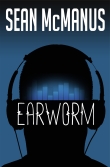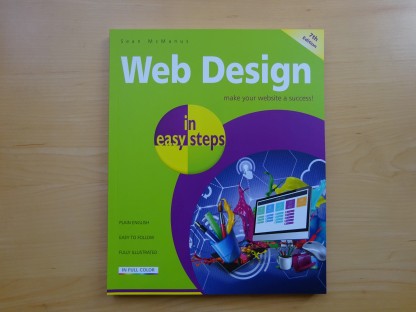December 2007
How to write a novel
by Sean McManus, author of 'Earworm'
 I've met many people who say they'd like to write a novel and only two who have actually finished one. So now I've finished mine, I feel qualified to share some tips about the logistics involved. I'm not going to tell you how to paint a scene or structure a plot: there are many better-qualified people to do that.
I've met many people who say they'd like to write a novel and only two who have actually finished one. So now I've finished mine, I feel qualified to share some tips about the logistics involved. I'm not going to tell you how to paint a scene or structure a plot: there are many better-qualified people to do that.
Although my day job is writer, I don't think that gave me much of a head-start. I'm used to people telling me what to write. Believe me, a blank page with no brief is as intimidating to me as it probably is to you. What you and I most likely have in common is that we're writing in the gaps between a full time job - evenings and weekends.
Three ugly truths of novel writing
If you're going to write a novel, you need to accept three ugly truths.
- The first is that you're not writing a bestseller. If your goal is to get rich, you're better off spending your time doing a paper round and buying lottery tickets with the money. In the UK alone, 130,000 new books are published annually. That means that there are 356 new books every day. Maybe you'll strike it lucky. But the odds are stacked so overwhelmingly against you. The only good reason to write a novel is that you'll enjoy it. It's not worth being a tortured artist in the hope you'll get a payday at the end.
- The second ugly truth is that it's damned hard work. It takes dedication to complete a book. If you're writing a story of 100,000 words, you'll need to write about 2000 words every week for a year. I'm not saying your book should be that long. Publishing formats (including online) are much more flexible nowadays. But you do need to be sure you can commit the time necessary to finish the kind of book you want to write.
- The third bad tiding is that you're going to waste a lot of time. You'll need to rewrite scenes as your story evolves. You'll probably want to re-do earlier bits, as you get to know the characters better and improve your writing skills. You might spend a weekend writing a chapter you delete outright. Sometimes you have to write a scene to see whether it works or not. I don't think anything from the first three months of writing (perhaps more) survived into my final story. And that is very much a good thing. If you can't accept you'll waste time, you'll find it hard to delete stuff that really should go.
Once you accept those truths, you have absolute creative freedom. You don't have to conform to traditional notions of what kind of books sell. You don't have to meet anyone's deadlines but your own. And you can write whatever you like. If you'll enjoy writing it, write it.
You can publish online in a range of formats, including print-on-demand paper books and ebooks. Your book will definitely be published if you want it to be, and you're prepared to do the work necessary to self publish (which is probably less than the work involved in attracting a conventional publisher). Write for the fun of it, and have faith that you can get your story into circulation at the end.
You might not have millions of readers, but you will have a wonderful experience. Enjoy the journey.
17 tips for writing a novel
- Don't tell everyone what you're doing. Maybe it's just me, but I'd rather work on the book than talk about it, particularly as the ideas are likely to change dramatically over time. You would probably rather have your friends read the story when it's finished than tell it to them while you're writing it. People aren't that interested in hearing about writing anyway and there's not that much you can say about it. Some days it flows, some days it doesn't. If you need support, find a writers' forum online.
-
Tools are only tools. The New Novelist
 software tries to break your story down into small chunks (such as descriptions of places and people), which you glue together and wrap around their plot template. Nanowrimo makes the whole thing less daunting by getting you to focus on hitting 50,000 words in a single month (November each year). There are dozens of books with forms you fill in about characters and plot points. But they're only tools. However you slice and dice it, you're still going to have to do the work and you'll need to find the commitment to do that somewhere else. I see how the community aspect of Nanowrimo is helpful, but all you really need to write is a simple word processor. Maybe not even that. Some of the greatest books were written by hand.
software tries to break your story down into small chunks (such as descriptions of places and people), which you glue together and wrap around their plot template. Nanowrimo makes the whole thing less daunting by getting you to focus on hitting 50,000 words in a single month (November each year). There are dozens of books with forms you fill in about characters and plot points. But they're only tools. However you slice and dice it, you're still going to have to do the work and you'll need to find the commitment to do that somewhere else. I see how the community aspect of Nanowrimo is helpful, but all you really need to write is a simple word processor. Maybe not even that. Some of the greatest books were written by hand.
- You can't write it without actually writing it. People pop up in writing forums all the time and say things like 'I'm writing a book in my head' (which means they're daydreaming) or 'I'm planning my novel' (which means they're making notes). The thing that stops most people from writing a novel is that they don't actually sit down and write, dammit! My favourite cartoon, which I have framed on my desk, is from Private Eye. First man says: "I'm writing a book." The second man replies: "Neither am I."
- You can't plot it all in advance. Okay, so maybe some people can. But many more people use planning to procrastinate. It's a lot easier to develop the story once you have some wordcount behind you, and there's nothing to stop you going back and changing bits you wrote earlier. Once you've planned enough to see the rough direction, start writing.
- Don't post work in progress. If you put chapters on your blog before you've finished the whole thing, you'll probably write yourself into a corner. During the project, you will almost certainly need to change earlier sections to accommodate ideas you have later.
- It's all about time management. Try to protect long stretches of time. It's a lot easier to make progress in a single four-hour stretch than it is to do so in four one-hour chunks, because it takes time to warm up. Plan time to write and stick to the plan. If you just write when you feel like it, you'll run out of steam. If you write when you don't fancy it, after about 15 minutes you'll be in the zone.
- Separate the thinking from the writing. When people say they have writers' block, they mean they've run out of ideas. So make sure you've got plenty ready to use before you sit down to write. Work on your novel when you're stood in a bus queue, going for a walk or in the bath. The thing that takes time is the thinking.
- Gather material. Collect your ideas, newspaper cuttings, photos, and website links in one place. Build a pool of material you can draw on when you're writing. I used pocket-sized notebooks because it meant I could jot ideas down wherever I was. When I looked back over them, some of the ideas I'd clean forgotten. If you don't write your brainwaves down immediately, you'll lose some of your best material.
- Don't try to shoehorn it in, though. Accept some ideas won't fit - even good ones - and you'll make the story mis-shapen by trying to force them in. You can always keep these ideas for short stories or other projects you might choose to do later.
- Tick off the material you use. Avoid using the same idea twice, by annotating where you use the ideas in your notebook. I struck through the stuff I used in green and the stuff I later rejected in red.
- Use a different file for each section. A single Word file containing the whole story is harder to use than different files for each section. You can start the filename with a chapter number (01, 02, 03...) to sort in Windows Explorer. You can easily swap sections around by changing the filename. Worry about combining the sections into chapters and a book later on.
- Write what you can, when you can. Don't think you have to write the story from beginning to end. Write the bits you feel inspired by at the time you're inspired by them. If you're stuck on one bit, write something else and come back to it later. If you write little sketches you can drop in later, it gives you something to graft the rest of the chapter around when the time comes.
- Getting started is hard, but sustaining momentum is tougher. You'll probably hit a wall around 10,000 words, when you've already introduced your main characters and now need to make sure they're all busy. You might well hit another one later if your plot gets too tangled and you can't see how to unravel it. Take a few weeks off if you need it. But don't give up. It probably won't be any easier to start a different story from scratch. And everyone who ever finished a novel faced similar problems and solved them.
- Keep a plan. It's quite hard to navigate 100,000 words and remember where different sections are. Keep an Excel grid with notes on what happens where, what the purpose of each section is and what the word count is. Look out for sections that are inappropriately long. Track which characters appear in which sections, and where things take place, so that you can ensure the story has variety and none of the key players sit on the bench for too long.
- Edit. Try to cut 10% off your word count with each round of revisions.
- Savour the writing. Enjoy playing with words, shaping ideas and editing your copy. Have fun with your imaginary friends. Put your favourite music on. Writing a book is a fantastic experience. If you're suffering for your art, you've got it all wrong. It's about the process, not the end result.
- Shelve it. When it's finished, leave it alone for a few weeks. Then read it from start to finish. You'll have forgotten some bits, and will be able to enjoy them as a reader will. And you'll spot some bits you want to cut, and other bits you want to tighten. Don't rush it to market.
Useful reading
Remember they're only tools, not answers, but I found the following helpful:
- Writing Tools by Roy Peter Clarke. There are plenty of books for new writers, but this one helps writers with experience to develop their style. Some of the ideas are simple, but take on new life in this book thanks to the inspiring examples from journalism and fiction.
- Is there a book in you? by Alison Baverstock. A quirky book that explains what kind of character you need to write a book. Focused on mainstream publication, but full of inspiring quotes from established authors.
- Fiction First Aid by Raymond Obstfeld. Outlines common problems and how to solve them. Gets overly theoretical in the last section, but the rest is excellent. The best advice I picked up from this book is to try moving a scene to a different location if it's not working.
Earworm
 Sean McManus's novel 'Earworm' is a satire of the music industry, based around a major record label and all those who invest their hopes and dreams in it. The book is independently published and can be bought online now.
Sean McManus's novel 'Earworm' is a satire of the music industry, based around a major record label and all those who invest their hopes and dreams in it. The book is independently published and can be bought online now.
"Raising a number of surprisingly sophisticated issues, this book is enjoyably cynical about the seemingly cold-hearted and impenetrable nature of the record industry and peppered with a number of highly comical cameos from the cream of rock'n'roll, which ensures that it never feels like heavy going."
- Record Collector Magazine. More great reviews!
Where next?
See all my writing tutorials and articles here.

 I've met many people who say they'd like to write a novel and only two who have actually finished one. So now I've finished mine, I feel qualified to share some tips about the logistics involved. I'm not going to tell you how to paint a scene or structure a plot: there are many better-qualified people to do that.
I've met many people who say they'd like to write a novel and only two who have actually finished one. So now I've finished mine, I feel qualified to share some tips about the logistics involved. I'm not going to tell you how to paint a scene or structure a plot: there are many better-qualified people to do that.
 Sean McManus's novel 'Earworm' is a satire of the music industry, based around a major record label and all those who invest their hopes and dreams in it. The book is independently published and can be bought online now.
Sean McManus's novel 'Earworm' is a satire of the music industry, based around a major record label and all those who invest their hopes and dreams in it. The book is independently published and can be bought online now.




